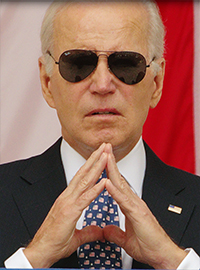| Federal Reserve: Bidenomics Disproportionately Hurting Minorities |
 |
|
By Timothy H. Lee
Thursday, November 02 2023 |
As Joe Biden’s perplexed supporters struggle to grasp his increasingly grim reelection prospects, they should digest a new Federal Reserve report exposing how Biden’s policies have disproportionately punished a core constituency: minority voters. As it is, Biden possesses no margin for electoral error. In the 2020 election, he won the White House on the basis of just 43,000 total votes in Wisconsin, Georgia and Arizona. If 22,000 of those voters had flipped to Donald Trump instead of Biden, Trump would’ve won reelection. Since that time, recalling Ronald Reagan’s pointed question in 1980, how many Americans will say next year that they’re better off than they were four years earlier? Further highlighting the point, Trump leads Biden in the RealClearPolitics polling average. That was never the case in 2020. Just one year ahead of election day, losing Black and Hispanic support poses a particularly grave threat to Biden. According to the Federal Reserve, however, that’s precisely the prospect he faces. Specifically, the report shows that after adjusting for inflation, the average Black family’s income has declined 2% since 2019, while Hispanic family incomes have declined 1%: Adjusted for inflation, incomes for the typical family across race and ethnicity were roughly stagnant. Income increased 1 percent for the typical White family and 6 percent for the typical other race family. The typical Black and Hispanic family’s income fell by 2 percent and 1 percent, respectively. Exacerbating matters, the Federal Reserve study revealed that Black and Hispanic families’ overall wealth is also less liquid, meaning that they were less able to meet required payments: While families can also cover expenses using wealth, particularly for Black and Hispanic families the gains in wealth were concentrated in housing, which is somewhat illiquid and may not be as useful as liquid wealth for covering recurring expenses. As shown in Figure 4, real average liquid wealth, which includes assets such as cash, checking, and savings accounts, did not grow much for Hispanic families and fell for Black families. In a period of high inflation, soaring credit card debt and increasing economic uncertainty, that declining illiquidity only sours moods further. Indeed, the study reveals a growing sense of dread regarding future conditions: Figure 10 shows the share of families who reported that they were uncertain about next year’s income increased since 2019 for every race and ethnicity. However, the step-up in uncertainty for Black and Hispanic families was especially strong – 14.2 percentage points and 10.9 percentage points more families reported uncertainty about their income next year, respectively, considerably more than the increase among White families (7.0 percentage points). Other families also reported an increase in uncertainty of 9.2 percentage points. Once again, the cross-race patterns appear consistent with transitory income sources propping up families’ income that they did not expect to continue in the future, especially for non-White families. It's bad enough when voters consider their current conditions precarious, but with just one year left before the presidential election, pessimism toward future conditions and lack of optimistic trajectory presents even greater electoral peril. All of this is a natural and foreseeable consequence of Biden’s own policy agenda, which accelerated inflation and now interest rates at the expense of lower-income Americans. As one familiar example, consider the Biden Administration’s electric vehicle (EV) agenda, which would require 60% of all new autos to be EVs by the year 2030, rising to 67% by 2032. Only 5% of new cars sold in 2022 were EVs, and only 12% of Americans say they’d seriously consider purchasing one. One reason for that is that the average EV price is $66,000, which is not only nearly $20,000 higher than the overall average new car price, but also $12,000 above the median U.S. income of $54,000 in 2022. Or consider that in July 2022, there were a dozen types of new vehicles under $20,000. Today there is just one. Both domestically and abroad, the Biden years have been characterized by growing chaos, uncertainty and difficulty. As the new Federal Reserve report shows, Biden’s critical constituency of Black and Hispanic voters have been impacted hardest of all. If he continues his stubborn refusal to correct course despite every indication of policy failure, Biden will have earned a 2024 electoral rebuke that appears increasingly likely. |
Related Articles : |
























